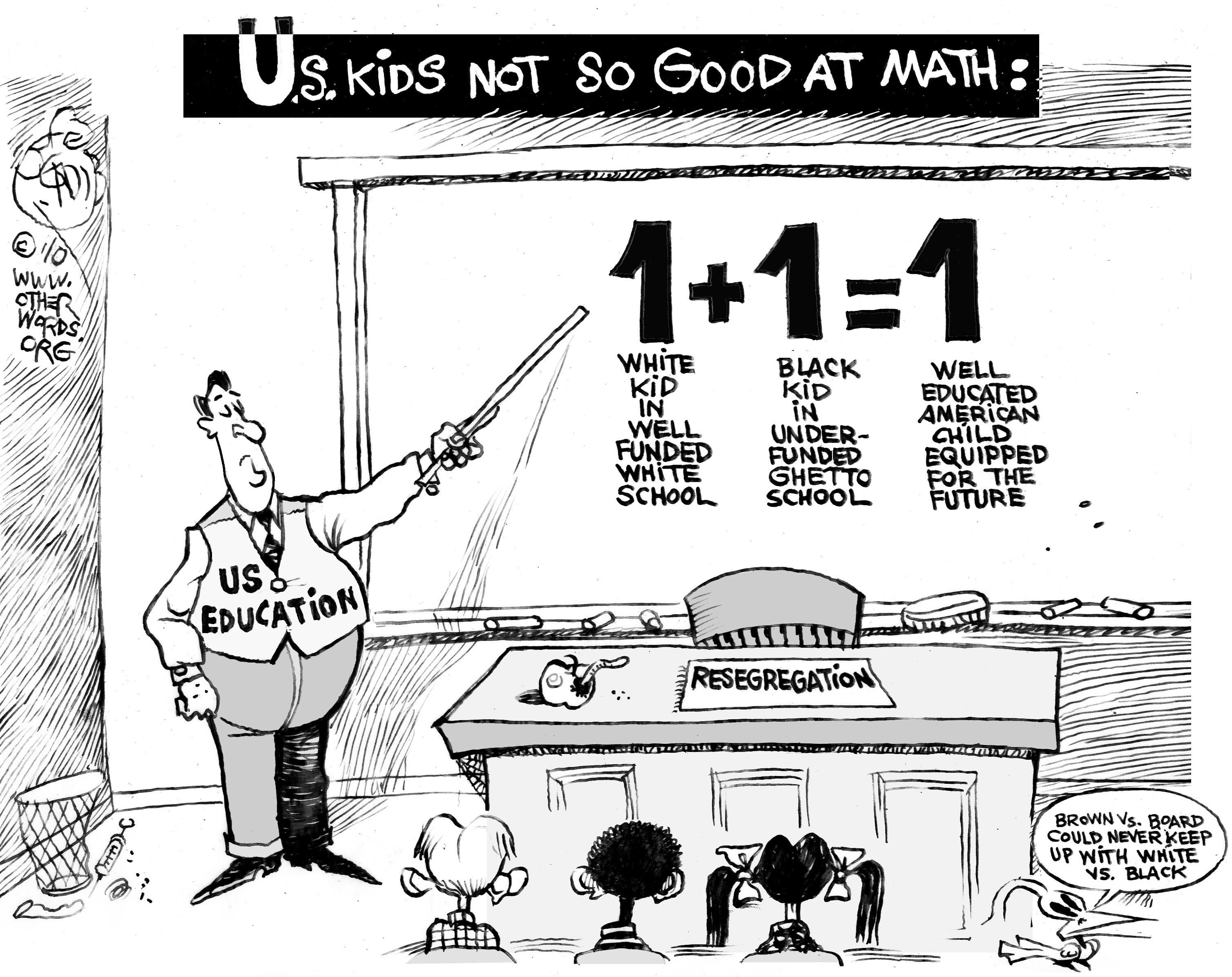When the Brown vs. Board of Education occurred, lawyers, parents, students, and members of communities fought to cease legal racial segregation in America. At the time, schools were either whites only or blacks only. So on May 17, 1954, The United States Supreme Court unanimously got rid of anything constitutional that had to do with separation of race. They made education an equal opportunity for races of all kind. According to the website, "The victory transformed the nation." Even though this case played a big role in changing our country to where it is today, it "did not constitute a perfect solution to the problem of unequal opportunity." We can go back and read Peggy Mcintosh's article, White Privilege: Unpacking the Invisible Knapsack, where Mcintosh discusses all of the opportunities that whites still have over blacks today.
In the video, Tim Wise, who wrote the book Between Barack and a Hard Place, argues how racism is still an obstacle that needs to be overcome. In his own words, he emphasizes that "even with the long history, the ball hasn't moved as much." What he means is that even though we have done a little bit to improve racism, we still have a long way to go. Wise brought up some really eye opening points throughout the video. He explains how we are unaware of the two types of racism : racism 1.0 and racism 2.0. Racism 1.0 is the racism that we all know i.e. stereotypes and discrimination. Racism 2.0 is what Wise calls "exceptionism." His example of that is voting for Barack Obama in the last two elections so that you won't be considered racist for not voting for Obama. Like Brown vs. Board of Education, the victory of Obama changed our country because it broke tradition, but it did not stop racism itself. Listening to Wise explain about racism 1.0 and 2.0 was interesting, because I never knew it actually existed. It reminds me of when I first read Lisa Delpit's The Silenced Dialogue and had no idea that the culture of power existed. Wise brings up another excellent point when he mentions that Obama went to Harvard and if he didn't, he probably wouldn't have become president. But if a white person didn't attend Harvard, he or she would still be eligible to become president. This annoys me a bit because yes, Harvard is a popular university, but there are colleges and universities that are just as great. A person of color is still well educated, even if he or she didn't attend Harvard.
In his article Separate and Unequal, Bob Herbert argues that we tend to avoid the issues of racism. Right away, this reminded me of Johnson's allusion of fire from his article, Privilege, Power, and Difference, and how people are too afraid to speak up and say that there is an actual fire. Herbert also stresses that impoverished students, which are mostly made up of black and Latino should be permitted to attend the same schools as middle class students, so that they can get equal quality of education. According to Herbert, after the Brown vs. Board of Education case, "we are still trying as a country to validate and justify the discredited concept of separate but equal schools." (pg. 1) There has been some progress though because Herbert reports that "some middle-class schools have been willing to accept transfers of low-income students when those transfers are accompanied by additional resources that benefit all the students in the schools." (pg. 3) It is great that these low-income students are finally getting the proper education that they need, however, it would be better if all low-income students had the same opportunity. I remember reading Kerri Ulucci's Pathologizing the Poor and this quote : "As we [future educators] strive to educate all children, understanding the pitfalls and promise of educating children in poverty requires clear eyes, new perspectives, and a determination to break the us/them dichotomy." (pg. 21) By allowing impoverished students to enroll in higher income schools, this is a small step in the right direction, however that is not enough.
The Brown vs. Board of Education case, Wise, and Herbert all have goals in changing America for the better. The Brown vs. Board of Education case was a huge highlight in American history, but Wise and Herbert are pushing for even bigger and better changes. Wise and Herbert hope for all races to be equal and have the same opportunities. No one should be left behind because of their race. The relationship of Wise and Herbert's arguments and the case of Brown vs. the Board of Education makes me think about the chorus of the traditional song, We Shall Overcome.
Oh, deep in my heart
I do believe
We shall overcome
Someday
Points to make: I found this PBS documentary that really helped me understand and learn more about the Brown vs. Board of Education case.When will everybody be equal? At least some impoverished students in our country are starting to learn how to fish instead of just receiving them, but when will all impoverished people be able to achieve that skill? I have one of the many answers: It is definitely going to take more than a village to fix these conflicts.

Great job as always Julienne! Never have anything negative to say about your awesome entries! :)
ReplyDeleteJust wanted to say I thought it was comical how you referenced the bringing the fish vs teaching how to fish analogy. Very nice job as always.
ReplyDelete